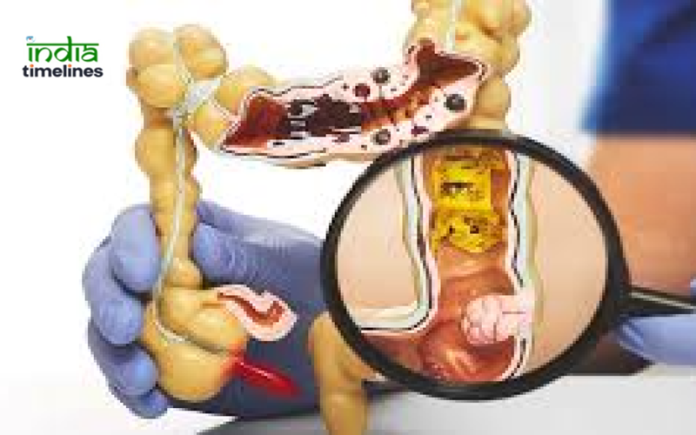
Colorectal cancer is one of the most common types of cancer worldwide, affecting both men and women. It is a disease in which cancerous cells form in the tissues of the colon or rectum, which are parts of the large intestine. Due to its prevalence and the potential for early detection through screenings, awareness of colorectal cancer is vital. This article will explore the causes, symptoms, diagnosis, treatment options, and prevention strategies for colorectal cancer to help you better understand this serious health condition.
What is Colorectal Cancer?
- Overview of Colorectal Cancer
Colorectal cancer begins when abnormal cells in the colon or rectum start to grow uncontrollably. While it can begin in either part, colon cancer and rectal cancer are often grouped together because they share many similarities. The colon is the first part of the large intestine, and the rectum is the final section that connects to the anus. Both are crucial in the digestion process, responsible for absorbing water and nutrients, and eliminating waste.
The majority of colorectal cancers develop from benign growths known as polyps. Over time, some of these polyps can turn cancerous.
- Difference Between Colon and Rectal Cancer
The primary difference between colon and rectal cancer lies in their location. Colon cancer starts in the colon, while rectal cancer develops in the rectum. While both types share symptoms and treatment options, rectal cancer may have specific concerns due to its location near the anus.
Risk Factors for Colorectal Cancer
- Age and Family History
Age is one of the biggest risk factors for colorectal cancer. The majority of cases are diagnosed in people over the age of 50. If you have a family history of colorectal cancer, your risk may also be higher. Inherited genetic mutations, such as those found in Lynch syndrome or familial adenomatous polyposis (FAP), can increase the likelihood of developing colorectal cancer at a younger age.
- Lifestyle Factors
Lifestyle choices significantly impact your risk of developing colorectal cancer. A diet high in red and processed meats, low in fiber, and lacking in fruits and vegetables may contribute to increased cancer risk. Additionally, smoking and excessive alcohol consumption are known to elevate the likelihood of developing this disease. Regular physical activity and maintaining a healthy weight can reduce your risk.
- Pre-existing Health Conditions
Certain conditions, such as inflammatory bowel disease (IBD), which includes Crohn’s disease and ulcerative colitis, increase the risk of colorectal cancer. People with these chronic conditions have a higher chance of developing cancer due to the inflammation and cellular changes in the colon. Moreover, individuals with a history of polyps are more susceptible to colorectal cancer.
Symptoms of Colorectal Cancer
1. Early Symptoms
In the early stages, colorectal cancer may not cause noticeable symptoms, which is why screening is so important. Some early warning signs include changes in bowel habits, such as diarrhea, constipation, or a feeling that the bowel does not empty completely. Unexplained weight loss, fatigue, and occasional abdominal discomfort may also be signs of the disease.
2. Advanced Symptoms
As the cancer progresses, more noticeable symptoms can develop, including rectal bleeding, blood in the stool, or persistent abdominal pain. You might also experience unexplained anemia due to blood loss. If the cancer spreads to other organs, symptoms such as jaundice, difficulty breathing, or pain in specific body parts can occur.
How Colorectal Cancer is Diagnosed
1. Screening Tests for Colorectal Cancer
Several screening methods can detect colorectal cancer early, even before symptoms appear. Colonoscopies are one of the most common and effective screening tools, allowing doctors to examine the inside of the colon and remove polyps before they turn cancerous. Stool tests, such as the fecal occult blood test (FOBT), can detect hidden blood in the stool, a potential sign of colorectal cancer.
Blood tests may also be used to identify biomarkers associated with colorectal cancer. These tests, however, are not as conclusive as imaging studies or biopsies.
2. Imaging and Biopsy
Imaging techniques like CT scans and MRIs can help identify the presence of tumors and the extent of cancer spread. In some cases, a biopsy may be performed to confirm cancer diagnosis. A biopsy involves taking a small tissue sample from a suspected tumor to examine under a microscope for cancerous cells.
Staging and Grading of Colorectal Cancer
- Understanding the Staging System
The stage of colorectal cancer determines how far the cancer has spread and what treatment options are available. The stages range from 0 (localized) to IV (advanced, spread to other organs). Staging helps doctors assess the prognosis and tailor treatment plans for individual patients.
- What Does Grading Mean in Cancer?
Grading refers to how abnormal the cancer cells look under the microscope and how quickly they are likely to grow. Low-grade cancers look more like normal cells, while high-grade cancers look more abnormal and are more likely to spread quickly.
Treatment Options for Colorectal Cancer
- Surgery for Colorectal Cancer
Surgical removal of the tumor is often the first step in treating colorectal cancer. The type of surgery depends on the location and stage of the cancer. For early-stage cancers, the tumor and surrounding tissue may be removed through minimally invasive techniques, such as laparoscopic surgery. In more advanced stages, a larger portion of the colon or rectum may need to be removed.
- Chemotherapy and Radiation Therapy
Chemotherapy uses drugs to kill cancer cells or stop their growth, often used after surgery to target any remaining cancer cells. Radiation therapy uses high-energy radiation to shrink or destroy tumors, sometimes used in conjunction with chemotherapy to treat rectal cancer more effectively.
- Targeted Therapy and Immunotherapy
Targeted therapies work by targeting specific molecules involved in cancer growth, such as genetic mutations. Immunotherapy, on the other hand, boosts the body’s immune system to recognize and fight cancer cells more effectively. These therapies are often used for advanced cases or those that do not respond to traditional treatments.
Managing the Side Effects of Colorectal Cancer Treatment
- Physical and Emotional Impact
Cancer treatments can be physically and emotionally draining. Managing pain, fatigue, and the side effects of chemotherapy is important. Support from a healthcare team and family members is crucial for emotional well-being during treatment.
- Supportive Care and Palliative Care
Palliative care focuses on providing comfort and improving the quality of life for patients with advanced colorectal cancer. It can help alleviate symptoms like pain, nausea, and shortness of breath while offering psychological support to both patients and families.
Prevention and Early Detection of Colorectal Cancer
- Diet and Lifestyle Modifications
Maintaining a healthy diet, rich in fiber, fruits, and vegetables, and low in red and processed meats can help reduce the risk of colorectal cancer. Regular exercise, avoiding smoking, and limiting alcohol consumption can also lower your chances of developing the disease.
- Importance of Regular Screening
Screening is crucial for detecting colorectal cancer early when it is most treatable. Individuals aged 50 or older, or those with a family history of colorectal cancer, should discuss screening options with their healthcare provider.
Living with Colorectal Cancer
- Coping with Diagnosis and Treatment
Living with colorectal cancer requires emotional resilience and strong support systems. Patients and families may find counseling, support groups, and mental health care beneficial as they navigate the challenges of diagnosis, treatment, and recovery.
- Survivorship and Post-Treatment Care
After successful treatment, regular follow-up care is essential to monitor for any recurrence of cancer. Survivorship programs can provide additional support in adjusting to life after cancer, both physically and emotionally.
India Time Lines
Conclusion
Colorectal cancer is a serious health concern that requires attention to risk factors, early symptoms, and proper screening methods. With early detection and the right treatment plan, many patients go on to lead full and healthy lives. Awareness, healthy lifestyle choices, and timely screenings can significantly reduce the burden of this disease.




























